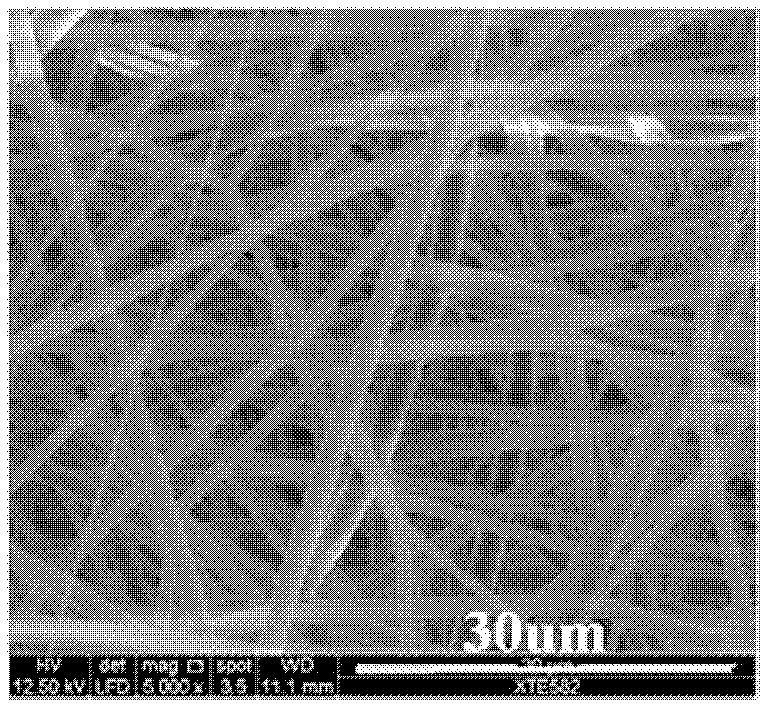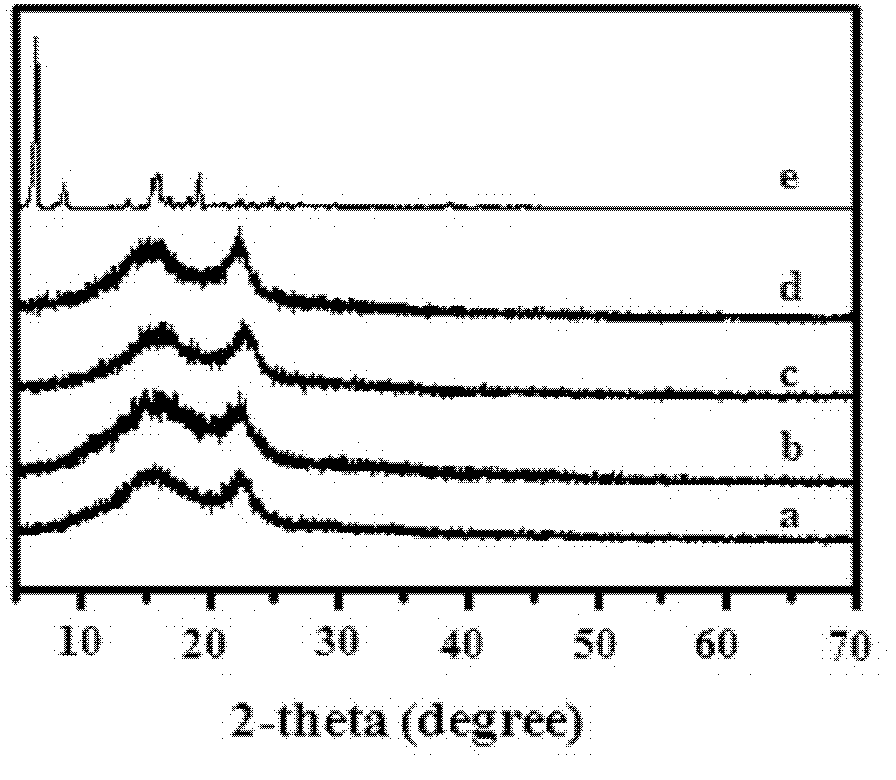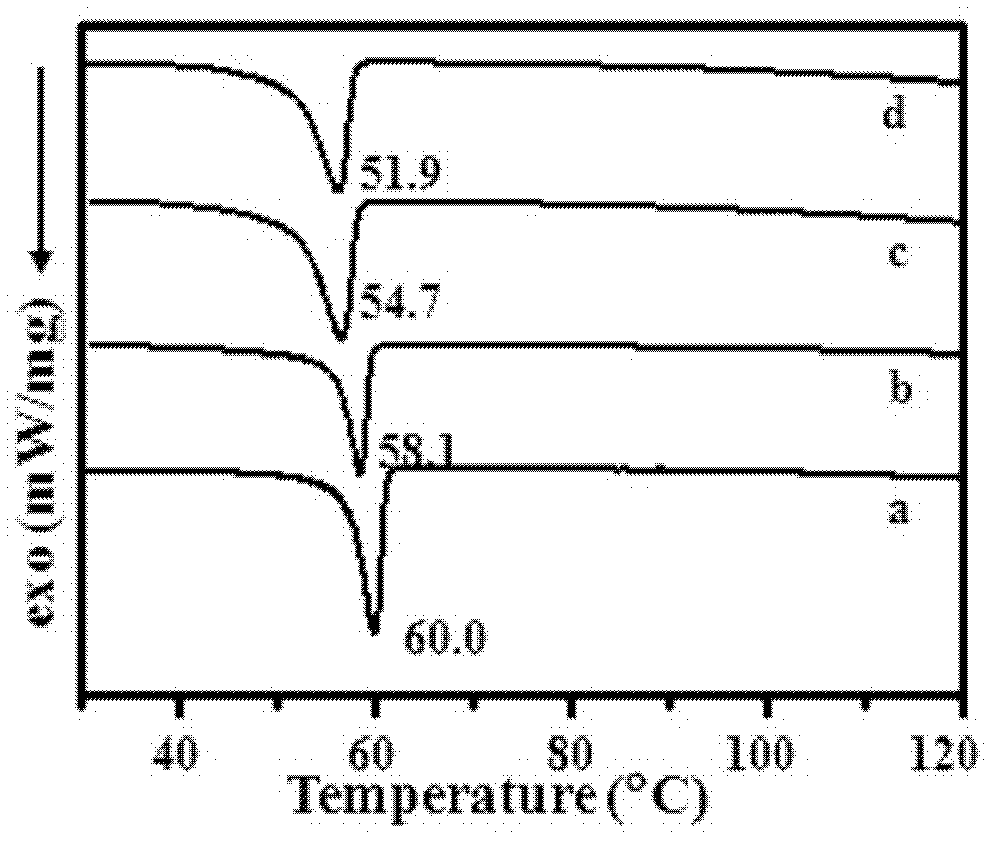Micro/nanometer fiber slow release preparation for treating cicatrices and preparation method thereof
A slow-release preparation and nanofiber technology, applied in the field of biomedicine, can solve the problems of ginsenoside Rg3 being difficult to disperse uniformly, difficult to achieve effective absorption of slow-release drugs, and solution turbidity, so as to protect and inhibit the desorption of drug molecules, good Small molecule size effect and high carrying efficiency
- Summary
- Abstract
- Description
- Claims
- Application Information
AI Technical Summary
Problems solved by technology
Method used
Image
Examples
Embodiment 1
[0056] Mix 100mg of ginsenoside Rg3 into 1g of trifluoroacetic acid, stir until slowly and fully dissolved to form a transparent solution; fully dissolve 1g of polylactic acid (PLLA) in 3g of dichloromethane to obtain a transparent and uniform solution; Slowly added dropwise into the stirred PLLA solution to obtain a transparent drug and polymer mixed electrospinning solution.
[0057] Set the voltage in the electrospinning technical parameters to 10KV, the flow rate to 0.6ml / min, the distance from the needle to the collecting plate to 15cm, the temperature to 25°C, and the relative humidity to 50%. Use a flat plate to collect the two-dimensional micro / nanofiber membranes. The collected film-shaped fiber aggregate sustained-release preparation was vacuum-dried for 2 days to obtain a film-shaped fiber aggregate sustained-release preparation containing ginsenoside Rg3 drug. Obtain the scanning electron micrograph of film-shaped fiber aggregate slow-release preparation as figure...
Embodiment 2
[0059]Add a certain amount of 20mg, 60mg, and 100mg of ginsenoside Rg3 into 1g of hexafluoroisopropanol, stir until slowly and fully dissolved to form a transparent solution; fully dissolve 1g of polylactic acid (PLLA) in 3g of chloroform, respectively, Obtain a transparent and uniform solution; then slowly add three kinds of ginsenoside Rg3 solutions to the stirred three PLLA solutions respectively to obtain a transparent drug and polymer mixed electrospinning solution, according to the mass ratio of ginsenoside Rg3 and PLLA , the contents of ginsenoside Rg3 were prepared to be 2%, 6% and 10% of the polymer content respectively. By adjusting the technical parameters of electrospinning and using a flat plate as a collector, two-dimensional micro / nano fiber membranes are collected, and the collected fibers are vacuum-dried for 2 days at room temperature to obtain controllable release of ginsenoside Rg3. 6% and 10% biodegradable micro / nanofiber membrane formulations.
[0060] A...
Embodiment 3
[0064] This example is the same as Example 1, the only difference is that polyethylene glycol with a molecular weight of 2000 is added to each gram of PLLA solution, and the polyethylene glycol is 50 mg of the mass ratio of PLLA to obtain a controllable release of ginsenoside Rg3 drug The biodegradable polymer PLLA micro / nanofiber membrane preparation was continuously spun and collected by multiple grams of PLLA fibers, using a flat plate as a collector, and a fiber membrane with a thickness of 1 mm was collected.
PUM
| Property | Measurement | Unit |
|---|---|---|
| diameter | aaaaa | aaaaa |
| diameter | aaaaa | aaaaa |
| porosity | aaaaa | aaaaa |
Abstract
Description
Claims
Application Information
 Login to View More
Login to View More - R&D Engineer
- R&D Manager
- IP Professional
- Industry Leading Data Capabilities
- Powerful AI technology
- Patent DNA Extraction
Browse by: Latest US Patents, China's latest patents, Technical Efficacy Thesaurus, Application Domain, Technology Topic, Popular Technical Reports.
© 2024 PatSnap. All rights reserved.Legal|Privacy policy|Modern Slavery Act Transparency Statement|Sitemap|About US| Contact US: help@patsnap.com










